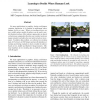Free Online Productivity Tools
i2Speak
i2Symbol
i2OCR
iTex2Img
iWeb2Print
iWeb2Shot
i2Type
iPdf2Split
iPdf2Merge
i2Bopomofo
i2Arabic
i2Style
i2Image
i2PDF
iLatex2Rtf
Sci2ools
115
click to vote
ICCV
2009
IEEE
2009
IEEE
Learning to predict where humans look
For many applications in graphics, design, and human computer interaction, it is essential to understand where humans look in a scene. Where eye tracking devices are not a viable option, models of saliency can be used to predict fixation locations. Most saliency approaches are based on bottom-up computation that does not consider top-down image semantics and often does not match actual eye movements. To address this problem, we collected eye tracking data of 15 viewers on 1003 images and use this database as training and testing examples to learn a model of saliency based on low, middle and high-level image features. This large database of eye tracking data is publicly available with this paper.
Actual Eye Movements | Computer Vision | ICCV 2009 | Most Saliency Approaches | Top-down Image Semantics |
Related Content
| Added | 18 Feb 2011 |
| Updated | 18 Feb 2011 |
| Type | Journal |
| Year | 2009 |
| Where | ICCV |
| Authors | Tilke Judd, Krista A. Ehinger, Frédo Durand, Antonio Torralba |
Comments (0)

